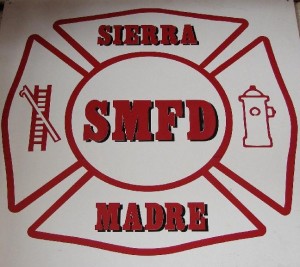 City Council voted last night to approve a re-structuring of the Sierra Madre Fire Department that would eliminate the Paramedics Coordinator position and the Fire Marshal position, and add three paid Captain positions to the department. The current Paramedic Coordinator and Fire Marshal would remain as Captains, and their duties would be incorporated into the duties of the new Captains position.
City Council voted last night to approve a re-structuring of the Sierra Madre Fire Department that would eliminate the Paramedics Coordinator position and the Fire Marshal position, and add three paid Captain positions to the department. The current Paramedic Coordinator and Fire Marshal would remain as Captains, and their duties would be incorporated into the duties of the new Captains position.
Reason for Restructuring
The restructuring was described by Chief Steve Heydorff in the Staff report as “The next step in the continuous improvement of the Sierra Madre Fire Department.” According to Heydorff, the intent of the restructuring is to “improve response times, enhance supervision and bring the department closer to the goal of automatic aid.”
According to Heydorff, staffing a fire engine requires one captain, one engineer (driver and pump operator) and two firefighters. The least expensive schedule for 24/7 on-site staffing requires three captains, three engineers and six firefighters. Currently, the firefighter positions are adequately filled by volunteers, with the availability of captains and engineers varying daily. Heydorff stated that the proposal he was presenting seeks to ensure the constant staffing of the fire engine by a qualified captain.
Currently, the “firefighter” portion of the staffing has 2 to 4 volunteer firefighters in the station 24/7. Over time, this has evolved from these positions mostly filled by local residents to the current status, in which most of the firefighters are recent academy graduates who are not residents of the City, who volunteer to complete an apprenticeship that will result in state firefighter certification.
The captains staffing is, however, a “combination” model, which consists of paid and volunteer participants filling the role of captain. Weekdays, the captain role is taken by the fire marshal and the paramedic coordinator. However, weeknights and weekends, the captain role is filled by volunteers who respond from home to the fire station. This slows down response times, because the engine can not leave the station until the captain arrives. According to Heydorff, the possibility that the volunteer may not receive the call or may be unable to respond is the main reason that Sierra Madre is not included in the 12-city Unified Response automatic aid agreement. Under Unified Response, when 11 of the 12 participating cities experience a structure fire, additional resources are automatically dispatched from neighboring cities at the same time that the engine from the city in which the structure is located is dispatched. In Sierra Madre, part of the time, our engine must wait for the captain to arrive at the structure, then verbally request mutual aid from other agencies. Sierra Madre’s inability to guarantee immediate dispatch by having an on-site captain has prevented its inclusion in the reciprocity agreement.
Chief Heydorff also stated that analysis of recent data indicates that response times could be cut by two minutes if captains were in place at the station full time. According to the Chief, in the initial stage of a fire, it doubles in size every two minutes, so cutting the response time by two minutes could mean the difference between confining the fire to the room in which it started or allowing it to spread to other parts of the structure.
He also noted that while paramedics generally arrive on the scene two minutes earlier than the engine when the captains are not at the station, they are unable to begin advance life support until the engines arrive on the scene because they are busy with basic life support issues. That two minutes could prove critical to some patients, particularly those in need of resuscitation due to cardiac arrest.
Chief Heydorff also stated that the addition of round the clock captain staffing at the station would improve supervision, training, teamwork, maintenance, and performance.
Cost of Adding Full-time Captain Position
Cost to add a full-time paid captain to the department (two of the three captain positions are already funded as fire marshal and paramedic coordinator) is estimated at approximately $130,000/yr. Salary would be somewhere between $66,357 and $84,690 a year, with the balance up to $130,000 made up by benefits and retirement. CalPERS designates the position as “public safety personnel” which means a higher percentage of employer and employee retirement costs compared to non-public safety personnel. A survey of salaries for captains at fire departments of five local communities (Arcadia, Monrovia, Pasadena, San Marino and South Pasadena) showed that on average captains are paid $80,637 to $101,400, with South Pasadena the lowest at $74,340 to $90,360.
Chief Heydorff and four battalion chiefs made a presentation to the Kiwanis Club on March 15th that discussed the proposed (now approved) restructuring of the Department. To view that video, click here.
